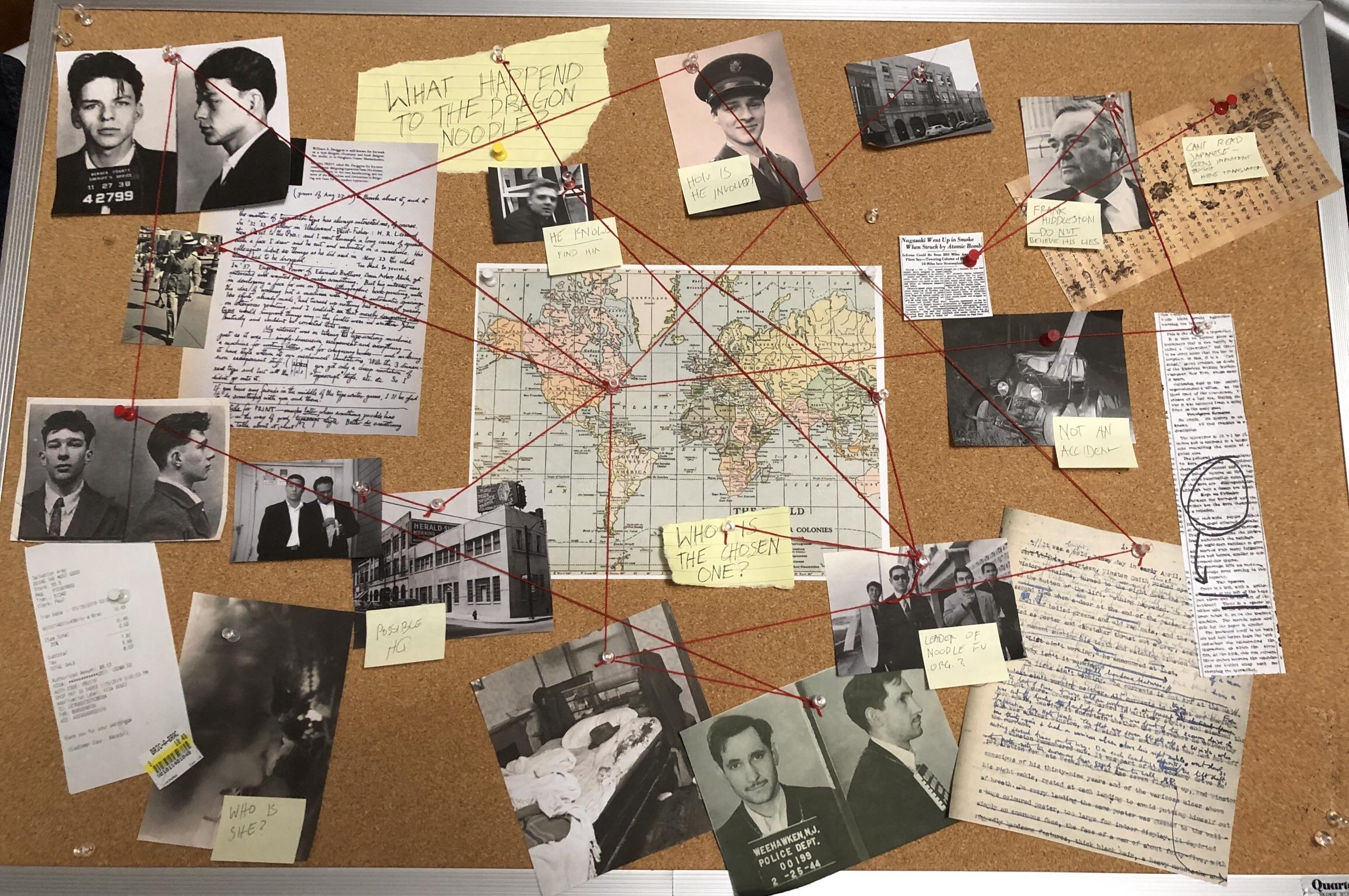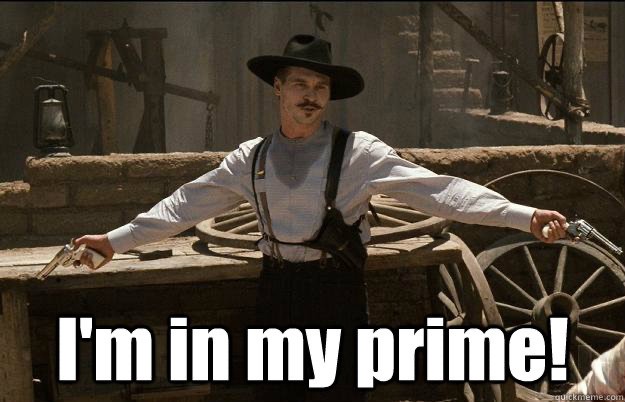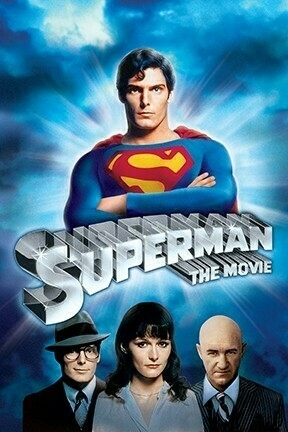
The 1978 “Superman,” starring Christopher Reeve, launched the superhero film genre as it exists today. We rewatched it recently, enjoyed it, and I recommend it.
However, the movie takes a painfully long time to get going.
”Superman” starts with pages turning on the 1938 Action Comics issue that launched the Superman character, narrated by a child’s voice-over. We did not remember this from seeing the movie previously. We wondered whether we had accidentally rented the wrong version of “Superman.” We had not. Onward.
Then we go to Krypton, where the movie creeps forward. We see Marlon Brando as Superman’s father, Jor-El, wearing white stunt hair and a turtleneck with the Superman logo in it.
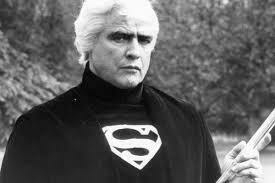
I wish the phrase “phoning it in” was not a cliche so I could use to to describe Brando’s performance. He drones on and on, making one speech after another.
He’s concluding the prosecutor’s statement in the trial of three insurrectionists (ripped from the 2020s headlines!), who end up being sentenced to the Phantom Zone. I’m sure we won’t see these insurrectionists again—they won’t be any trouble and will not turn up in “Superman II.”
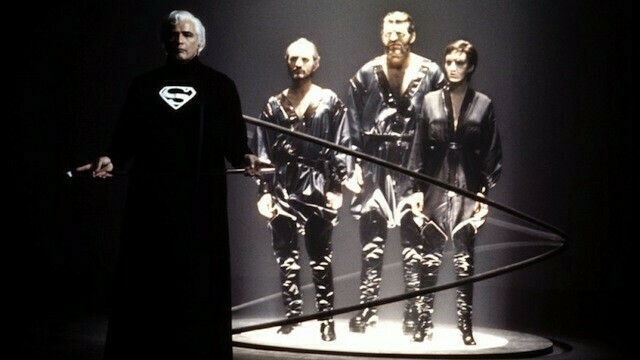
General Zod, played by Terence Stamp, is the leader of the trio, and his scenery-chewing is the only good part of this scene.
I saw “Superman” with friends in the theater during its first run in 1978, and I was very excited to tell them after the movie all about the Phantom Zone. I even guessed that the three villains would feature in the movie sequel. I was very proud of myself for this. Possibly related: It took me a long time to lose my virginity.
Jor-El warns the leadership council of Krypton that the whole planet is about to explode within a month. The leaders say this is fake news because they did their own research on YouTube. The council nopes out on evacuating the planet and tells Jor-El he can’t tell anybody about his beliefs or else he’ll be an insurrectionist (that word again). A sensible person would have told the council to fuck right off because the council was not going to have any clout after the ENTIRE FUCKING PLANET EXPLODES. But Jor-El just goes along with it.
Brando goes back home, where he and his wife (if her name is spoken, I didn’t hear it) put on matching glowy silver lamé jumpsuits. They put their baby in a spaceship. Before sending the baby off to Earth, Marlon Brando makes a very long speech, while his wife looks at him with an expression like she wants him to shut up because she needs to pee.
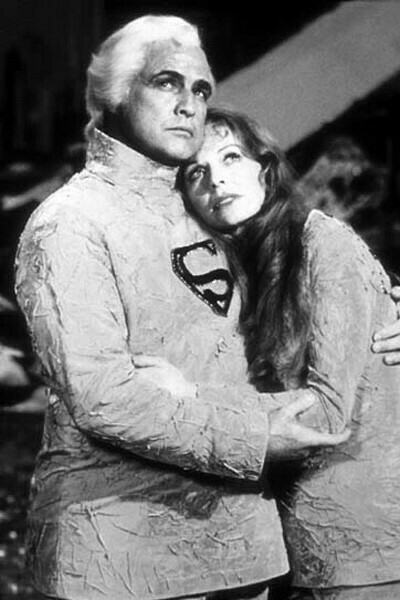
Then we’re off to Earth, to whip through young Clark Kent’s childhood. The costumes and cars and brilliant. The scenery from the Kent farm is beautiful, but there is way too much of it. Can we get this movie moving already?
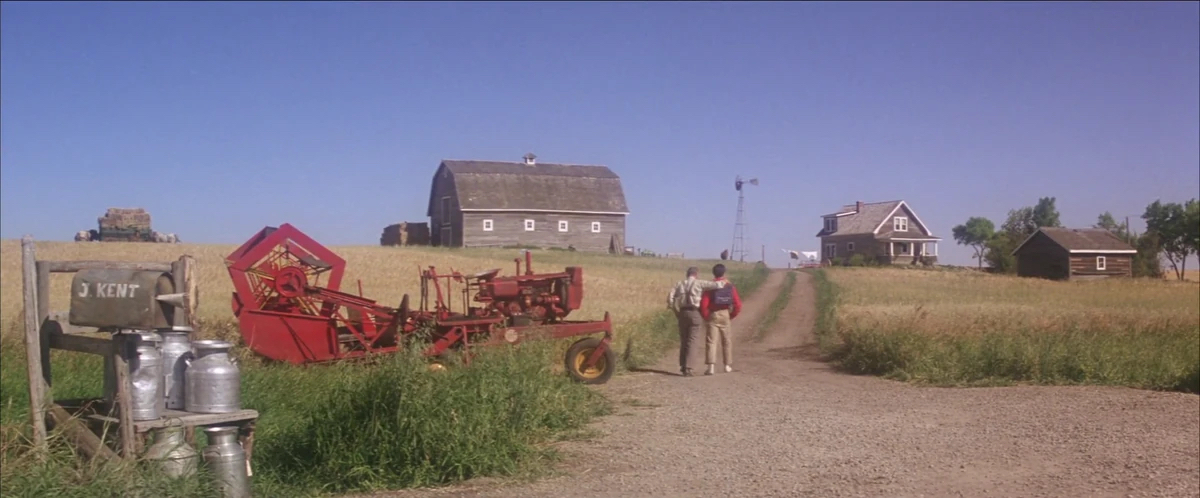
Clark challenges his father to run from the end of their driveway to the barn. Pa Kent has a heart attack and dies. Clark never mentions his own role in Pa’s death. That seems odd.
Next stop: the North Pole, where young Clark spends 12 years being lectured by the holographic Marlon Brando, and we, in the audience watching the movie, get to experience every painful second of those 12 years.
All this time, Clark is played by an actor who is not Christopher Reeve and doesn’t even look much like Christopher Reeve. This guy:
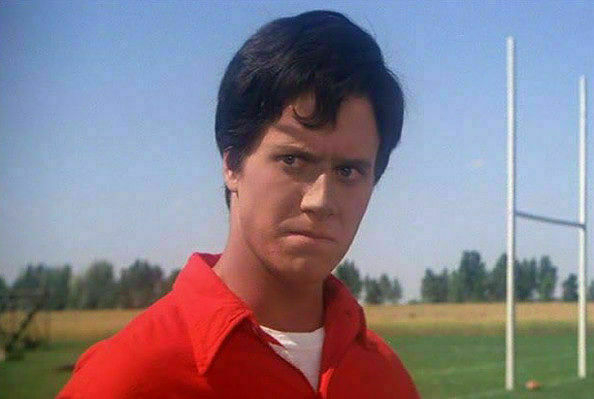
But after 12 years at the North Pole, demonstrating powers of super-boredom-resistance, Clark becomes Christopher Reeve and emerges in his spiffy super-suit, which makes all the girls swoon. He is a hunka hunka burnin love. The suit is very flattering, but he really should be wearing something modest below the waist and above the knee to better cover his prominent super-johnson. Maybe bermuda shorts with a festive luau pattern?
Or maybe something like this:

And we’re off to Metropolis and the movie takes off and keeps going. Finally! Lois Lane is fast-talking and smart; Christopher Reeve transforms from a nebbishy Clark into a charismatic Supe through the power of acting. Gene Hackman, Ned Beatty, and Valerie Perrine are the villains, and they chew the scenery delightfully. The sets are gorgeous, particularly Lex Luthor’s lair in the underground lobby of Grand Central Station. Why is Grand Central Station abandoned and apparently nearly forgotten in this movie? Does it even matter? No, it does not.

Lois’s costumes are the height of 70s couture. The first thing we see her in is a nice skirt and blouse. And the skirt has pockets. And they look like BIG pockets. In some ways, technology has gone backward since 1978.

The Daily Planet newspaper takes up an entire skyscraper and has a helicopter to shuttle reporters around. I started work at a daily newspaper not long after “Superman” came out—we didn’t even have a budget to buy coffee for the staff. Employees had to pay for their own coffee.
Lois arranges an interview with Superman, which turns into a date. He flies her around the skies above Metropolis. She recites a love poem in her mind. The poem is painfully bad. It is like watching someone you like embarrass themselves in a talent competition.
We see a very neatly dressed and well-groomed mugger. Nice blazer, turtleneck sweater. He needs a closer shave, but we’re otherwise good.

It’s part of a whole sequence of Superman’s day’s work, as he stops a cat burglar heist, rescues Air Force One after it loses an engine, and rescues a little girl’s cat from a tree.
The ending of the movie, where Lois Lane dies (spoiler for a 45-year-old super-popular movie—don’t DM me!) is surprisingly dark. She’s smothered after being buried in an earthquake and we see all of it happening. But Superman quickly brings her back from the dead with his superpowers.
Superman’s flying SFX are every bit as good and dazzling now as they were in 1978. Oh, some of the matte shots with the New York City skyline in the background are a little fake, but Superman’s movements are brilliant. A one-second bit where Superman changes from his Clark street clothes into his superhero costume while in flight is just wonderful—nothing much today but brilliant in the pre-CGI era that this movie was made in. Some of the other special effects, like Hoover Dam disintegrating and a downstream town flooding, are a little obviously done with miniatures but they still look fine.
(Why do the sfx look fake now but not in 1978? I have a theory. In 1978, we saw these sfx on the big screen, where they looked great. They might still look great today on a big screen. Soon after, we saw the movie on smaller TVs, with lower quality screens than today, and the sfx still looked great. But today’s high-quality TVs make the sfx look fake—the screens aren’t big enough to compensate for the flaws revealed by the high definition.)
The movie can’t decide if it’s a camp superhero parody, or a serious superhero movie. It would have been better if it toned down the broad comedy and made Lex Luthor more scary.
Reeve’s acting carries the movie. There’s a scene that’s famous among fans where Lois Lane and Clark Kent are in the living room of her apartment. She leaves the room, and he decides to tell her he’s Superman. Until that moment, he’s a shlub, round-shouldered and with a goofy expression on his face. He stands up straight, squares his shoulders and jaw and takes off his glasses—and now he’s Superman. He starts to tell her. His voice as Clark is querulous and shaky, but Superman has a firm baritone. And he changes his mind, slumps his shoulders, puts on his glasses and now he’s Clark the shlemiel again. It all goes by in a few seconds, but it’s striking.
Even the special effects are carried by Reeve’s acting. “You will believe a man can fly,” was the marketing slogan for the movie when it was released. You believe it in large part because Reeve was hanging from wires, moving like a person flying. Acting.
I don’t have anything to say about John Williams’ musical score for the movie, except that it’s brilliant. I’m going to carry a Bluetooth speaker with me and play that score every time I enter a room.
Overall, well worth a watch. Maybe skip the first 48 minutes though. You don’t need to see it. You already know Superman’s original story.
Superman is my favorite superhero. He is optimistic and hopeful. He knows there is great evil in the world, but he knows that there is also great good, and he serves that good—“truth, justice and the American way." He knows some of what he says is corny and he says it anyway because he believes it. He is nearly all-powerful and invulnerable, but he is in awe of human beings because we are neither of those things, and yet we are capable of great kindness, nobility, and courage.
Sloppy Internet research
Four-year-old Clark Kent is played by an actor named Aaron Smolinski, who went on to a bit role in the 2013 Superman movie “Man of Steel” and also played Lex Luthor in a movie called “Superman: Solar,” which seems to be either an indy or fan-made Superman movie that got terrible reviews.
Larry Hagman has a cameo as an Army Major, making a joke that doesn’t age well.
John Ratzenberger plays an air traffic controller. He went on to play Cliff from “Cheers,” and do a lot of voice-overs for Pixar movies.
Kirk Allyn, who played Superman in 1940s Superman movies, has a cameo as Lois Lane’s father. When Clark is a boy in Smallville, little girl Lois sees Clark while passing through on a train, and Allyn appears in that scene. via
Noel Neill, who played Lois Lane in 1940s movies and the 1950s Superman TV series, also has a cameo. She’s Lois Lane’s mother in the same scene. via
“According to Sir Roger Moore’s autobiography, he witnessed Christopher Reeve walking through the canteen at Pinewood Studios in full Superman costume, oblivious to the swooning female admirers he left in his wake. When he did the same thing dressed as Clark Kent, no one paid any attention.” via
The Incomparable Mothership podcast did an episode about their “Superman” rewatch. They hated it. I don’t disagree with their criticisms, but for me, the virtues of the movie made up for its flaws. I enjoyed listening to the episode.
What happened to the actors
Marlon Brando continued working until his death in 2004. “Apocalypse Now” came out soon after “Superman.” His work in later life included two movies I quite enjoyed: “The Freshman” and “Don Juan DeMarco,” both of which are about charismatic rogues (though he only played the rogue in one of those movies). Brando also features in a delightful 2009 novel, “Chronic City,” by Jonathan Lethem, which explores the theme of whether we can believe anything or truly perceive reality. Brando isn’t a character in the novel. The characters can’t agree whether Brando is alive or dead, and the Internet is no help.
Margot Kidder struggled with mental health in later life. Her 2018 death was ruled a suicide. via
As of April 2023, Valerie Perrine, age 79, was suffering from advanced Parkinson’s and needed a hydraulic lift to get into and out of bed. The Hollywood Reporter did an excellent profile—recommended reading: Ailing ‘Superman’ Star Valerie Perrine Finally Finds Her Hero: “The Guy Should Be Sainted”:
Perrine insists she wants no pity and regrets nothing about her Technicolor life: not one affair (she’s been romantically linked to everyone from Jeff Bridges to Elliott Gould to Dodi Fayed); not one hit of acid (she’s taken LSD more than 400 times, by her estimation); not one career move (well, she probably should have said yes to 1981’s Body Heat and no to 1980’s Can’t Stop the Music, the Village People-starring megaflop she says killed her career, but you can’t win them all).
She sounds fantastic.
Gene Hackman has been retired for about 20 years. As of March, he was fit and healthy at age 93, spotted doing yardwork, buying and eating fast food, and pumping his own gas.
Christopher Reeve died in 2004, after being paralyzed in 1995 in a horse-riding accident.
Terence “General Zod” Stamp was one of the stars of “Priscilla, Queen of the Desert.” He played a drag queen named Bernadette.
Sarah Douglas, who played Ursa, one of General Zod’s cronies, appeared in a lot of B science fiction movies and TV shows, including one called “Strippers vs. Werewolves.”
Which Superman II?
We want to watch Superman II, which I remember as being even better than the first Superman, which was itself great. But which version?
Richard Donner directed the original movie and started directing on Superman II, but was fired, and Richard Lester was hired as a replacement. Donner had already done a lot of work, and Lester reshot many scenes and shot more. The Lester version was the original theatrical release, which I saw in theaters. We saw a fan cut of the Donner version in the early 2000s and did not care for it. It was unfinished. Some of the scenes were audition scenes; I remember some other scenes had cheap SFX that looked like they’d been done on 1990s home PCs.
Soon after we saw the fan cut of the Donner version, an official—and presumably more polished—version was released. We haven’t seen that.
I think when we do a rewatch, we’ll go with the original, theatrical version, directed by Lester. According to Internet discussion—for example, here—the official Donner version, while more polished than the fan cut we watched, is still unpolished and unfinished. And the theatrical version is lighter than the Donner version, while still having some serious moments. Generally, I like my superhero movies light; when they get dramatic and heavy I start having difficulty suspending disbelief.











